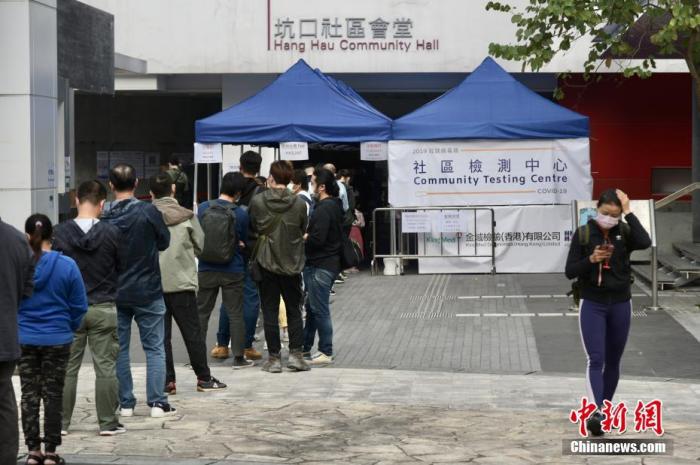(Fighting New Coronary Pneumonia) Hong Kong's newly diagnosed and more than 100 experts say that the remaining problems of prevention and control have not been resolved
China News Service, Hong Kong, December 4 (Reporter Shi Bingyun) The fourth wave of new coronary pneumonia in Hong Kong continued, and the number of newly confirmed cases on the 4th exceeded 100.
Experts pointed out that Hong Kong’s previous prevention and control loopholes have not been resolved, foreign imports are not strictly controlled, and the invisible transmission chain in the community still exists. Winter prevention and control may require more stringent measures.
Data map: Citizens lined up for testing.
Photo by China News Agency reporter Li Zhihua
On the 4th, the Center for Health Protection of the Department of Health of the Hong Kong Special Administrative Region Government announced 112 new confirmed cases of new coronary pneumonia that day, of which 100 were local cases and 36 were of unknown origin.
Zhou Bozhan, the chairman and doctor of Xiangjiang Zhihui, said that the reasons for the repeated outbreaks in Hong Kong are similar to those of previous waves. Now the remaining problems of "external prevention of import and internal prevention of proliferation" have not been resolved, so the repeated epidemics are "expected." ".
Zhou Bozhan said that the medical industry has anticipated the fourth wave of the epidemic in Hong Kong, but the actual arrival time was earlier than expected.
He pointed out that the industry predicted that the fourth wave of the epidemic was mainly due to the colder weather and the increase in the virus infection rate, but in fact, the temperature in Hong Kong when the epidemic broke out was still close to 30 degrees.
Zhou Bozhan pointed out that the source of the epidemic may be imported from Nepal, and the source virus is more infectious than previous strains.
He believes that Hong Kong's immigration control is not in place, and foreigners have not adopted strict isolation measures after entering the country.
This has resulted in some virus carriers having the opportunity to spread the virus on the way from the checkpoint to the isolation site.
They also have considerable freedom during the quarantine period. In particular, “home quarantine” people can contact family members and visitors, which increases the chance of the virus entering the community.
In addition, for the large-scale super-spreading group, the song and dance group, Zhou Bozhan believes that this reflects the lack of cooperation from the citizens and the failure to strictly observe the epidemic prevention measures. The government should adopt more stringent management measures in response to similar situations.
On the 3rd, Zhang Zhujun, director of the Infectious Diseases Division of the Center for Health Protection of the Department of Health of the Hong Kong Special Administrative Region Government, said at a briefing on the epidemic that the singing and dancing group involved 500 people and had penetrated many levels and corners of the community.
In an interview with a reporter from China News Agency, the Hong Kong Medical Association Dong Jisheng said that the Hong Kong Special Administrative Region government has tightened a new round of social distancing measures and imposed compulsory nucleic acid tests on high-risk groups. To a certain extent, it can reduce the chance of virus transmission, but it cannot trace the root cause. To find the source of the invisible patient.
He said that the chain of invisible transmission in the Hong Kong community has never been cut off, and the new cases detected every day are not the source of infection, and the spread of the virus has not stopped.
The government still needs to increase the number and scope of testing, identify those infected with no symptoms, and at the same time introduce policies to encourage Hong Kong citizens to participate in testing to increase their enthusiasm.
"It is necessary to let everyone feel the convenience and benefits in life after being tested, for example, it is safer to work and go out of the street, and business is more sustainable, which has a positive impact on the entire society."
With the arrival of cold air, Hong Kong has recently felt the coolness of late autumn.
Zhou Bozhan expressed concern about the next epidemic control. He pointed out that colder weather will increase the chances of virus infection, and the symptoms of infected people may also increase. In addition, overseas students and overseas Hong Kong residents will return to Hong Kong during the holiday season. The government should strengthen citizen education as soon as possible to improve citizens’ Cooperate with awareness and use laws when necessary to strengthen the control of the epidemic.
(Finish)

